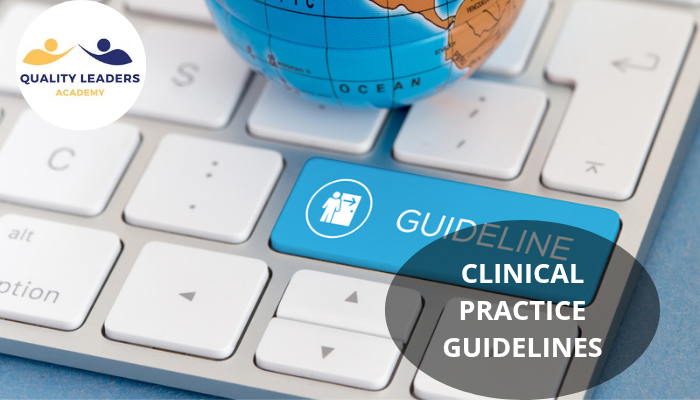Clinical practice guidelines play a vital role in ensuring consistent, evidence-based care across modern healthcare systems. They reduce variation in treatment, support patient safety, and guide clinicians in delivering consistent, evidence-based care. But implementing these guidelines isn’t always easy. Making a real difference requires strong leadership, a systems-oriented mindset, and a deep understanding of quality improvement, qualities that Certified Professionals in Healthcare Quality (CPHQ) bring to the table.
If you're a healthcare provider or manager seeking to improve outcomes, this article will help you understand what clinical practice guidelines are? Why do they matter for patient care? How does the Certified Professional in Healthcare Quality (CPHQ) prepare you to implement them effectively? Why is the CPHQ course from Quality Leader’s Academy a vital next step?
WHAT ARE CLINICAL PRACTICE GUIDELINES?

According to the Institute of Medicine (1990), clinical practice guidelines are carefully crafted recommendations designed to support both healthcare providers and patients in choosing suitable care options for particular medical situations.
They are created based on rigorous reviews of current scientific research, expert consensus, and clinical experience. These guidelines are developed and updated by globally respected organizations, including:
- World Health Organization (WHO).
- National Institute for Health and Care Excellence (NICE).
- Agency for Healthcare Research and Quality (AHRQ).
- Professional medical societies such as the American Heart Association and the American Diabetes Association.
CPGs address a wide range of clinical conditions and procedures, from chronic disease management to emergency care protocols, and are designed to help healthcare providers make decisions that reflect the best available evidence.
WHY ARE CLINICAL PRACTICE GUIDELINES SO IMPORTANT?
Inconsistent healthcare delivery is a widespread challenge. Two patients with the same diagnosis may receive different treatments depending on where they are or who is treating them. This kind of variability leads to:
- Delayed or incorrect diagnoses.
- Ineffective or harmful treatment.
- Increased healthcare costs.
- Decreased patient satisfaction and trust.
Clinical practice guidelines provide a standardized, evidence-based framework to prevent such inconsistencies. When used properly, they:
- Improve safety and treatment effectiveness.
- Support consistent care across providers and institutions.
- Enhance regulatory and accreditation compliance.
- Improve measurable patient outcomes.
For example, the implementation of sepsis care guidelines has led to significant reductions in mortality rates, as shown in studies supported by WHO and AHRQ.
CHALLENGES IN IMPLEMENTING CLINICAL GUIDELINES
Despite their importance, many guidelines are not fully implemented in clinical settings. Barriers to implementation often include:
- Lack of staff training.
- Resistance to change.
- Poor communication across departments.
- Limited time or resources to update workflows.
- Inadequate performance monitoring.
Overcoming these challenges requires not only knowledge of the guidelines themselves but also the ability to lead organizational change, redesign systems, and engage healthcare teams.
THE ROLE OF CPHQ-CERTIFIED PROFESSIONALS
Recognized worldwide, the Certified Professional in Healthcare Quality (CPHQ) designation is overseen by the National Association for Healthcare Quality (NAHQ). It confirms a professional’s expertise in areas such as:
- Clinical practice guideline implementation.
- Quality improvement methodologies (Lean, Six Sigma, PDSA).
- Data collection, analysis, and reporting.
- Risk management and patient safety.
- Accreditation and regulatory compliance.
CPHQ-certified professionals are often responsible for translating clinical guidelines into real-world practice. Their tasks may include:
- Developing policies and procedures based on clinical guidelines.
- Educating healthcare teams and monitoring performance metrics.
- Leading audits and quality reviews.
- Leveraging healthcare data to enhance patient outcomes and maintain alignment with regulatory standards.
These professionals play a central role in turning knowledge into results.
WHY CPHQ CERTIFICATION IS IN HIGH DEMAND
In today’s healthcare environment, quality outcomes are closely monitored by both internal stakeholders and external accrediting bodies. According to NAHQ, there is a growing need for certified professionals who can:
- Lead quality and safety initiatives.
- Ensure the implementation of evidence-based guidelines.
- Improve organizational performance.
Healthcare organizations, from hospitals to government agencies, are increasingly prioritizing the hiring of CPHQ-certified professionals for leadership roles in quality and compliance.
The CPHQ credential has become a strategic necessity rather than an optional addition.
WHY QUALITY LEADER’S ACADEMY IS THE IDEAL PLACE TO START

Quality Leader’s Academy offers a comprehensive and practical CPHQ preparation program, designed to help professionals succeed not only in the exam but also in real-world application.
Key features of the program include:
- A curriculum aligned with NAHQ’s latest exam blueprint.
- Instruction from experienced quality professionals who have worked with clinical guideline implementation.
- Real case studies drawn from hospitals and healthcare systems.
- Flexible learning formats, including online modules and recorded sessions.
- A strong support community for learning and collaboration.
Graduates of the program have gone on to lead successful quality improvement projects, earn promotions, and contribute meaningfully to safer healthcare.
BECOME THE LEADER WHO BRINGS GUIDELINES TO LIFE
Clinical practice guidelines are essential tools for modern healthcare. But without proper implementation, their potential to improve care is limited. The future of healthcare depends not just on knowledge, but on leadership, on professionals who can turn evidence into action.
If you are ready to take your career to the next level and make a lasting impact on patient care, consider enrolling in the CPHQ course at Quality Leader’s Academy.
You will gain the skills, confidence, and recognition to lead clinical improvement initiatives that truly change lives.
References
https://www.nccih.nih.gov/health/providers/clinicalpractice
https://www.aafp.org/family-physician/patient-care/clinical-recommendations/cpg-manual.html
https://www.uptodate.com/contents/overview-of-clinical-practice-guidelines



